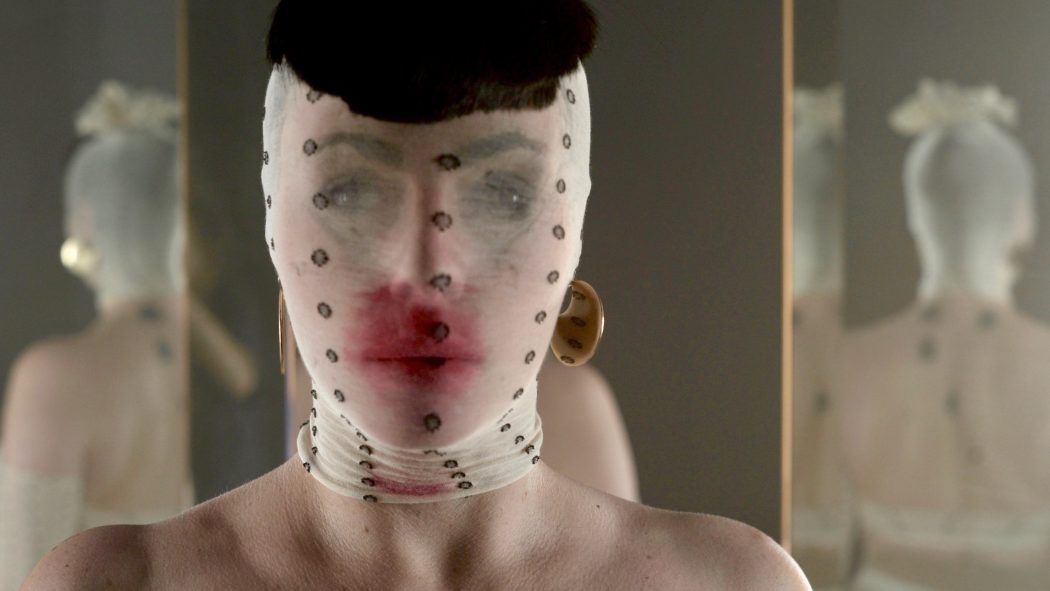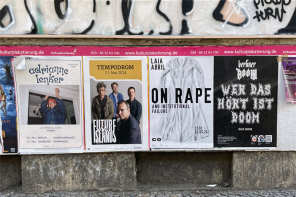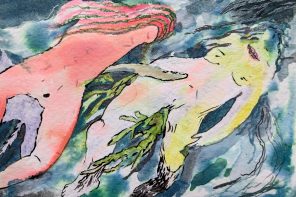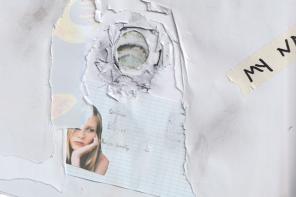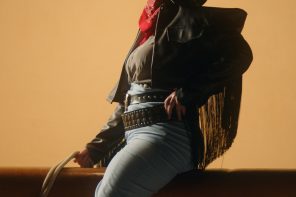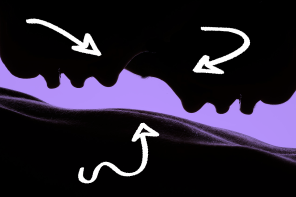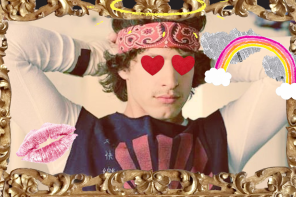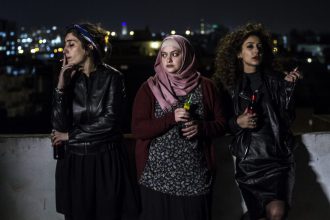Audio Transcription:
Interior. Night.
A large Melbourne downtown strip club. 3am. Thursday. The year is 2005. 90’s r’n’b plays. Lights change rhythmically. A woman is at work.
When I worked the club there was a large group of guys called The Regulars. They’d only ever arrive after midnight. Their constellation would vary. They weren’t customers in the conventional sense. They never got lap dances. They bought drinks and hung out and knew all the security and management and girls. Some were gangsters of varying degrees of seriousness. Most were associates with varying degrees of proximity to that life. Finishing up their shifts at restaurants, as drivers, as messengers, as cleaners, with their mothers or wives and kids – hustlers, grifters, dishwashers. Like most people in strip clubs, they were there to be somewhere other than alone. They were a community. And like any village knitting circle, they loved to gossip. They were like the chorus. Or hall monitors. Ironic cops of an erotic city. I would sit with them sometimes. One of them would buy me a drink and ask me about my night. Over the years, we talked a lot of shit together and as we did, I absorbed their gaze. This gaze doubled down on everything I had been taught while growing up about how to be as a ‘woman.’ It was the dominating gaze of the white, straight, man in late capitalism and it was paying my rent.
One night, my drinking buddy nodded towards a workmate who was crossing the floor with a customer, ‘Do you know how old Nikki is?’ he asked. ‘She’s 36. She’s olllllld, man. It’s dark in here so you can’t really tell. But yeah, Nikki, she’s been around for years. She’s olllllld.’
I feel a veneer of prickly panic slick down my chest and arms. I am 30. I have 6 years until The Gaze also classifies me as the walking wounded – an existential embarrassment in this scene. The trope of The Middle Aged Woman, at all of 36. A short summer before a long, cold winter in the wilderness.
‘But you’re looking good, Sass.’
Good? Good! I was getting away with it with the arbiters of normative desire. For now.
In her novel, The Buddhist, Dodie Bellamy critiques the writing of women characters by men like novelist Johnathan Franzen. She writes, “Middle aged women are such easy prey, like they are supposed to walk around with their eyes averted, hanging their heads in shame at their wreckage.”
The Middle Aged Woman is supposed to feel humiliated by her desires—both in sex and love, and in her ambition for her work. The script claims that this is ultimately about fuckability—how much The Gaze wants to fuck you. The Gaze argues that this is determined by a biologically wired Darwinian mechanism that is merely responding—beyond its own control, simply following orders—to external signs of reproductive use value. Desire is rhetorical. Desire is manufactured. Desire is weaponized. It is political. To imagine yourself as an object of desire to any other gaze including your own is to carve out a certain kind of freedom. Under The Gaze this freedom is controlled. Desire is policed. Desire is permitted or denied. This is why The Gaze encourages such violently marginalising moral scorn for sex workers. In commodifying their own fuckability, whores pose a liability to the script.
Under The Gaze, the physical signs of aging on a woman are a tragedy. On a man, they are distinguished. The Middle Aged Woman who comes to understand this suddenly knows too much. In many cases this has led her to lose patience with the permission of The Gaze. In some cases this coincides with the onset of menopause. In order to contain the spread of this disruptive knowledge, a moral sanction has been set that The Middle Aged Woman’s life should be an apology—for existing and for desiring. She has reached a moment where it is too late to ‘make it’ and too embarrassing to try. And through this, her rage about an obvious inequality is turned inward on itself. But, life from here on out cannot be an apology. Because that’s fucking miserable. And to whom exactly should The Middle Aged Woman apologise? Nikki didn’t apologize. She just kept making a whole lot more money than me and definitely more than most of The Regulars. For years. She had hacked The Gaze.
Interior. Night.
A Paris bar in the 3rd arrondissement. 9pm. Tuesday evening. The year is 2016. 90’s r’n’b still plays. Lights are subdued. A woman on tour is meeting new and old friends.
We are sitting in the bar. Me, my best friend from Berlin—a gay man, my best friend in Paris, and her best friend—also a gay man and a rising art star. It was a fun, bratty, friendly scene. Everyone eager to entertain on this double date outside The Gaze. The Rising Art Star turned the conversation to a peer in the local scene. ‘Yeah, she came to my opening. Oh my god, she brought her baby. She always has some critique. Always. She hates me. But whatever, there she was with her stroller. She’s 40. It’s over. Bye Bye.’
‘I am 40.’ I say.
‘WHAT?!? No! Oh, but that’s different!’
It is unclear why it is different. Because I didn’t have a baby? Because I was sitting right there? To unpack the misogyny of what had just been said would kill the vibe. So we didn’t. In truth, in this scene, I am 41. Lying about my age was a habit. I had been 35 for years. Handing over false papers hoping to buy a little more time in the company of those who do the mocking as opposed to those who are mocked.
The permission to desire and imagine oneself as the object of desire is futurity. It is to see oneself on a horizon, in community with others. It is not only about the people you want to do, it is about the things you want to make and be, the pleasures you might yet take. I arrived at my career as an artist ‘late.’ People do. My failure to be ‘on time’ has been a constant source of anxiety. Each 30 under 30 list. Each call out for young artists. Each ‘artists up to the age of 40 may apply.’ Each request for a date of birth on an application form or a catalogue bio. Each of these things tells people who have been occupied elsewhere – with care work, or in prison, or overcoming abuse, or addiction, or generally attempting to pull themselves and others out from under structural oppressions, or just fucking living – that they have failed to pass the white bourgeois milestones of decisive vocation, institutional training, unpaid internships, and emergent successes in a timely, respectable fashion. They are temporal deviants. And deviance does not go unpunished by The Gaze.
There is a reason why some feminist artists refuse to give their date of birth. There is a reason why some queer artists give multiple dates and places of birth in order to hack the trail of their digital identity. There are good reasons to lie about your age that have everything to do with access and survival, and absolutely nothing to do with vanity. There are reasons why the institutional machinery violently persists with fixations on age – they have been built for the white, middle class, cis male subject for whom time has been allowed its most elastic and forgiving form. This is not a problem exclusive to the art world. There are reasons why I have hesitated to tell the truth about my age even here to you now. Damnation awaits. Exclusion persists. The gates are kept. Shame is powerful.
Interior. Day.
A breakfast table in a downtown Munich hotel. 8am. The year is still 2016. Muzak plays. Lights are unforgiving. A woman on tour sits with another performer.
The topic of conversation is something like train tickets on smart phones or Instagram or email subject lines or something. My breakfast companion is far more established in their career. They are queer but they have been on time. They are unsure of how to perform a simple digital task. They are resigned to it being the arcane knowledge of some exclusive cabal of Digital Natives.
Me: ‘Babe! We are the same age. In fact, I think I am a year older than you, and I know how to do this. This is not beyond you.’
I had been working on kicking my habit.
Him: ‘Wait. We’re the same age!?! I thought you were like 34 or some shit. Oh girl! You are an ACTRESS!’
I am being rewarded for my deception. For passing. I am Dorian Gray. I am Cinderella’s wicked stepmother concealing the hag within as I take a risky bite from an apple at the breakfast buffet. I am being flattered. This is a compliment for ‘getting away with it.’
But why should that be a compliment? As a white Australian child in the late 70s and early 80s I was ritually, brutally sunburned each summer in cultural denial of the environmental conditions of my colonising existence. I smoked 2 packs a day from 17–35. I spent 10 years on speed. A lot of people died. A lot of horrible shit went down. I look how I look. It’s not a stroke of luck. I don’t have a secret. I suspect it’s that the popularly held cultural myth about what a 45 year old woman looks is so pessimistic and cruel that the reality feels like an exception.
For my colleague at breakfast, I had become an impressive trickster. A shape shifter. Yes, a deliberate deception about my age had felt like a necessary cloak of survival while I ‘caught up’. But now that I had ‘arrived,’ this act of deception was fast being replaced with an act of refusal. A refusal to succumb to the scorn of the cultural script that menaced my peace. A refusal driven by a politics of renewal. Staying interested, staying curious, staying disruptive – not as a strategy for passing as younger, but for living as a politically engaged subject.
‘Getting away with it’ is aesthetic. Unlike my colleague from the breakfast scene, there are some people I know whose art careers started in the 90’s and their aesthetic sensibility—from the clothes they wear to the work they make—remains there to this day. There has been a failure to renew. I see the consequences of this ossification for their artistic imagination. I see how position is not the same as relevance. I also see the consequences of a failure to renew for our political imagination. I understand how it sets in—a script needs revision but no-one has the time. They are getting away with it and habits are hard to break. But that’s what a good actress does, she breaks her habits.
Interior. Night.
A kitchen in an apartment just off Sonnenallee. 7pm. The year 2016 is drawing to a close. Frank Ocean plays. Lights are kind but offer no refuge from the truth. A woman meets with her lover of 5 months. They are 15 years younger than her. These two are on the brink of falling in love, or perhaps have recently fallen.
I am distraught. Sobbing. Unable to make eye contact and barely able to speak. I am about to tell The Lover my age. The months leading up to this moment had been increasingly torturous. I had gone from repeatedly googling younger man/older woman celebrity relationships – Tilda Swinton, Tina Turner…it’s a cute club – to having panic attacks on the street, obsessing over how I would have to completely change careers and get a stable higher paying job in order to afford the ongoing, extensive cosmetic procedures required to ‘keep my man’ by ‘looking good for my age.’ Internalised misogyny is a hell of a drug. The indoctrination of The Gaze’s script is real. I had been socialised to believe turning 40 was the stroke of midnight that arbitrarily transforms your mysterious ornate carriage into a lumpen giant pumpkin – in the way, broken-down on the pavement, going nowhere. And this sense of the arbitrary is what had led to my obsession with numbers. The Gaze had done a number on me and like any good abuser it had twisted my capacity to imagine a life without it. I had come here to tell the truth believing it was going to set me free…from the relationship.
Me: Guess.
Lover: Thirrrrty Se-vennnnn.
Me: Higher.
Lover: Forrrrrty.
Me: Higher.
Lover: 41.
Me (a hot mess of viscous snot and tears and grief and fear and letting go): yes.
Lover: Ok cool.
Deep loving gaze. Slightly bemused smirk. Prolonged kiss.
Me: Is it over?
Lover: Why?
In retrospect, this scene is utterly ridiculous. The dissonance with my politics was alarming. This is a cautionary tale of how aging under The Gaze affected me in my particular conditions. I had been anxiously lying to all my lovers, of all genders, about my age forever. Not even by much, just shaving off the top. Now I was IN LOVE. The Lover had graciously agreed for my age to remain unspoken for months. They didn’t even steal a glance at my passport when we got a plane back from Paris together a month before. This respect of my boundaries allowed me to feel safe enough to come clean and be seen. To disclose what I understood as my undesirable status. They didn’t care at all about how old I was, they just required honesty as a necessary condition of being together. The radical acceptance of a 26 year old queer babe released me from The Gaze in a way that was shocking to me. It brought on a flood of release as it taught me about how to love.
Two years later, we made a baby. Like all pregnancies over 35, the official medical label was ‘geriatric’…
Exterior. Dusk.
A mythic desert landscape. A wilderness in which time is elastic and could be both lost and found. On the horizon, Oedipus stumbles across the frame in an incidental cameo. The wind plays tricks on the mind. Lights allow for ambiguities. A woman is attempting to transcend a script.
In Australia, a wealthy western nation, the fastest growing demographic of homeless people are women over 55. Similar trends are emerging in Germany and elsewhere. The reasons for this phenomenon are complex, but the conflict between the cult of The Gaze and the trope of The Middle Age Woman smokes at its centre. The value of their lives’ care work carefully downplayed. Their menopauses are treated as a disdainful malady rather than a normalised, nuanced experience of transition. The lie of their unfuckability is weaponised against them. A life in submission to The Gaze leaves these women with nowhere else to go. The Gaze abandons them as it encourages the rest of us to have no compassion. This script is untenable. Refuse it. Renew it.
Words by Melanie Jame Wolf
Header Image by Ashton Green
Melanie Jame Wolf is an artist who lives and works in Berlin. Working solo and with friends, she makes projects for theater, gallery, and screen spaces. She has an ongoing interest in the body as a political riddle and performance as a technology of survival. Places where her work has shown include: nGbK, Schwules Museum, Sophiensaele, HAU – Hebbel am Ufer, Institute of Modern Art – Brisbane, The National 2019: New Australian Art Biennial, and VAEFF Film Festival NYC. Melanie Jame is the 2020/2021 Australian resident of the International Studio Program at Künstlerhaus Bethanien, Berlin.

